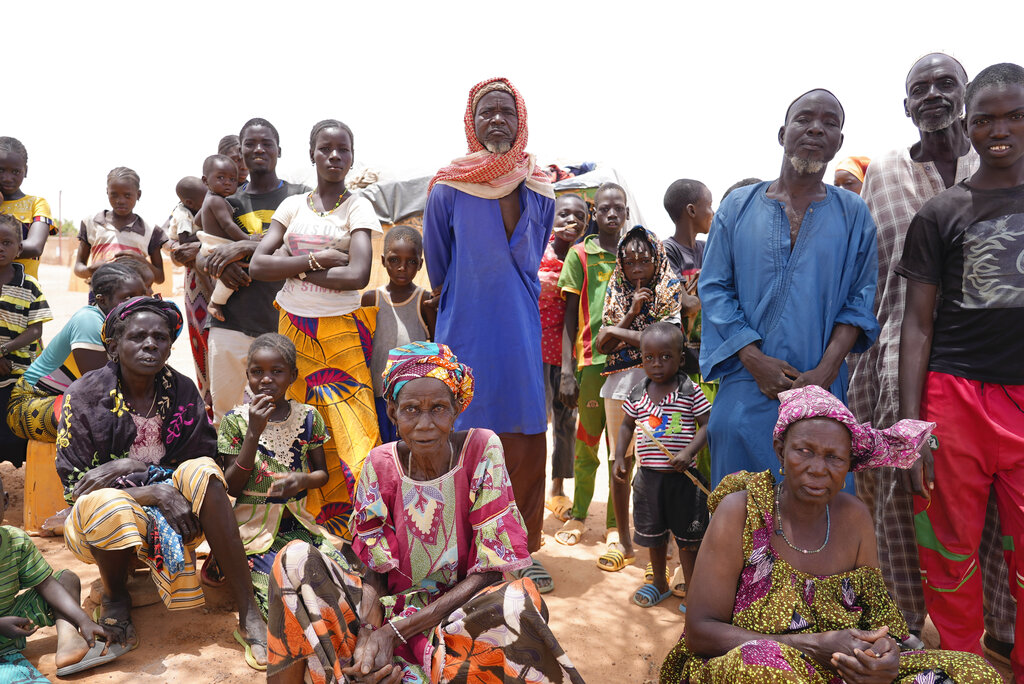Terrorist Blockades Prevent Aid from Reaching 500,000 in Burkina Faso
ADF STAFF
Hawa left her Burkina Faso home due to terrorist attacks five years ago and went to a town in the nation’s Sahel region. There, she depended on humanitarian aid to feed her family and picked vegetation from the bush to sell and eat.
Although Burkina Faso’s ruling military junta led by Capt. Ibrahim Traoré vowed to tackle terrorism when it took power in September 2022, extremist organizations in dozens of rural towns and villages have imposed blockades that make it difficult for humanitarian organizations to deliver aid.
Now, Hawa, a mother of six, is one of about 500,000 people under blockade in Burkina Faso caught in a blind spot of the humanitarian response due to a lack of funding and severe operational constraints, according to the Norwegian Refugee Council. Aid from international nongovernmental organizations has only reached 1% of civilians in half of the towns under blockade.
After movement restrictions were imposed, Hawa could no longer roam the bush, and aid dried up.
“We feel forgotten by those who can provide humanitarian assistance,” she told the refugee council. “Nobody comes to see us. We hear about humanitarian organizations, but we don’t see them anymore.”
This reality counters the narrative pushed by junta loyalists who say the country’s security situation is better off under military rule and that its forces have not yielded to terrorists.
Groups linked to al-Qaida and the Islamic State group impose blockades in areas where they believe residents are loyal to government forces, including civilians who have joined the junta’s Volunteers for the Defense of the Homeland (VDP) militia.
Traoré uses the VDP to bolster the Burkinabe military, which has fought extremists for more than seven years. Extremist fighters there have killed thousands and forced more than 2 million from their homes, according to the United Nations.
Although government officials have said 50,000 people have volunteered to join the VDP, insurgents hold as much as half of the nation’s territory, mostly in the north. This has resulted in destroyed communities and rampant hunger.
“Our brothers and sisters, cousins and nephews, our elderly, they live in total poverty,” a teacher who recently escaped the blockaded town of Pama told The New Humanitarian. The teacher said Pama once thrived due to its agricultural output, but “everything suddenly stopped” when the blockade was imposed in 2023. Now, basic goods like salt and soap are rare and expensive, the teacher said.
Residents of blockaded places told The New Humanitarian that their health services are collapsing, infrastructure is being attacked, and food is scarce because terrorists prevent them from accessing farms and pastures. Aid workers said they can access blockaded areas only with high-cost U.N. helicopters. They said distributions are infrequent and terrorists threaten to punish communities for accepting relief.
Rachel Mikanagu, director of the Forum of International Humanitarian Non-Governmental Organizations, said only about one-third of the money required to address the most critical humanitarian needs in Burkina Faso “was effectively allocated” in 2023.
“As it is extremely costly to provide assistance in the enclaved areas, the shortage of financial resources often leads organizations to prioritize people in need in other parts of the country,” Mikanagu told the Norwegian Refugee Council. “This results in a deeply concerning situation where populations already cut off from their farmlands and livelihoods and struggling to meet vital needs, also receive much less lifesaving assistance — undoubtedly being punished twice.”
As The New Humanitarian reported, military convoys periodically force their way through blockades to deliver supplies and humanitarian aid, and to help people escape their towns. But these operations are infrequent and are also regularly attacked by terrorists.
In August 2023, terrorists attacked a World Food Program (WFP) helicopter as it tried to deliver food to civilians in the town of Djibo.
“Such attacks challenge WFP’s work on the ground by disrupting lifesaving food assistance while increasing our operational costs and stretching our humanitarian dollar to the limit,” Elvira Pruscini, the program’s country representative and director in Burkina Faso, said on the organization’s website. “We simply cannot afford to interrupt our response which remains a critical lifeline to those in dire need.”


Comments are closed.